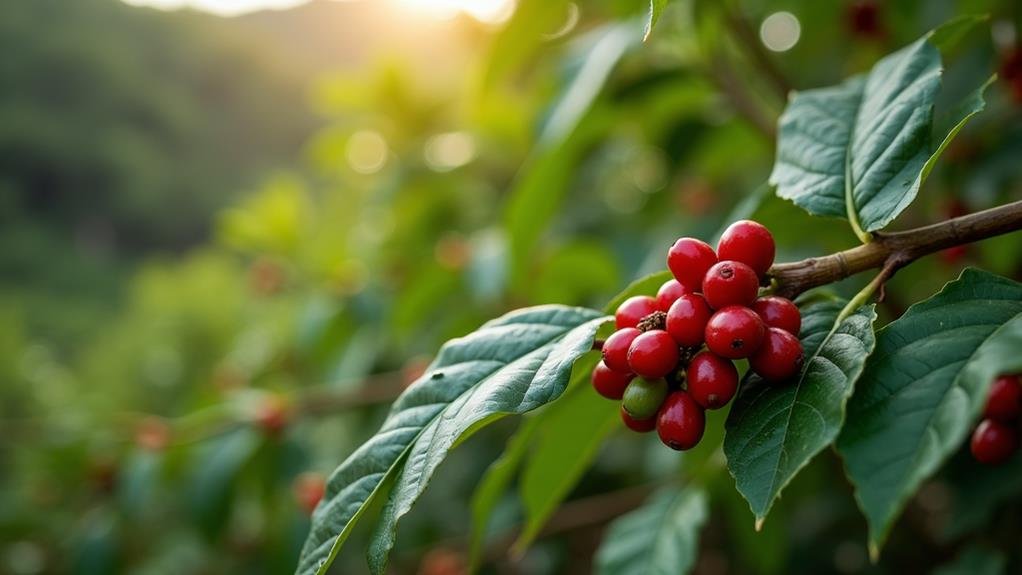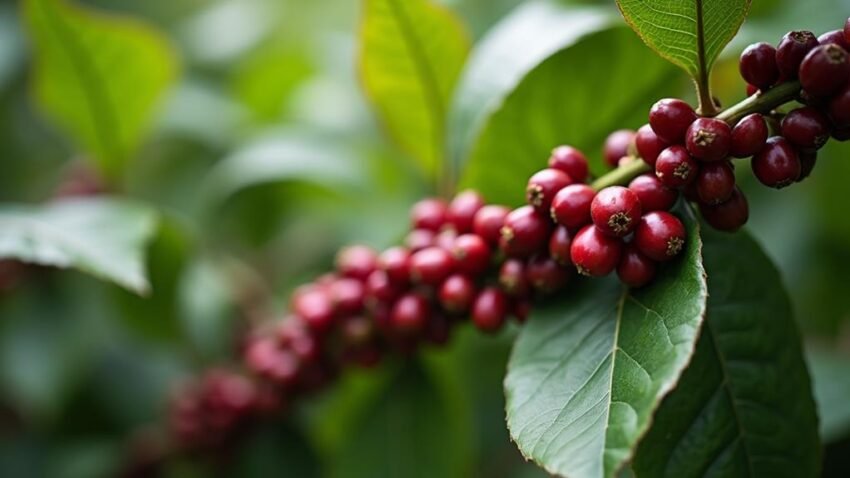I still recall the first time I savored a cup of Arabica coffee; it was like discovering a hidden garden in the heart of a bustling city—unexpected yet profoundly invigorating. Originating from Ethiopia, Arabica coffee is renowned for its intricate flavors and subtle fragrance, thanks to the Coffea arabica plant. With diverse lineages like Typica and Bourbon, each contributing to its unique taste profiles, it's no wonder Arabica beans are highly sought after for specialty coffee blends. But what makes this coffee so special? Let's explore the origins, varieties, and nuances that set Arabica apart from the rest.
Origins and History

Arabica coffee, recognized for its intricate flavors and subtle fragrance, has a rich and fascinating history that dates back to ancient times. The beginnings of Arabica coffee can be traced back to Ethiopia, where it's believed to be the first kind of coffee ever cultivated. This esteemed coffee is produced by the Coffea arabica plant, which thrives in cool, subtropical climates and is primarily cultivated at higher altitudes.
The expansion of Arabica coffee cultivation began in the 17th century, with Yemen playing a significant role in its early production. Yemen's advantageous climate and geographical location made it an ideal place for Arabica to prosper.
From there, Arabica coffee spread globally, becoming the most favored coffee variety worldwide. Today, it constitutes over 60% of the world's coffee production.
Comprehending the origins and history of Arabica coffee helps to value its distinctive flavor profile and why it remains a favorite among coffee aficionados. The journey from its Ethiopian roots to global production is a tribute to its enduring quality and appeal. Whether you're a casual coffee consumer or a devoted enthusiast, knowing the origins of Arabica enriches your admiration for this cherished beverage.
Varieties and Lineages
Understanding the origins of Arabica coffee sets the stage for exploring its diverse varieties and lineages. Arabica coffee, which originated in Ethiopia, has branched out into several key lineages that have shaped the global landscape of Arabica production.
The Typica lineage is one of the most important. It moved from Yemen to India, then to Indonesia, and eventually made its way to the Americas in the 18th century. This migration has contributed significantly to the genetic diversity of Arabica coffee production.
Another vital lineage is Bourbon, which was introduced to Bourbon Island (now Réunion) and later spread to Africa and the Americas. Both Typica and Bourbon genotypes are essential for the cultivation and diversity of Arabica coffee worldwide.
Ethiopian Landrace varieties also play a crucial role in Arabica coffee production. These varieties, along with Bourbon and Typica groups, form the basis of many Arabica varieties today. The genetic diversity provided by these groups ensures that Arabica plants remain robust and adaptable, allowing for a wide range of cultivation environments and flavor profiles.
Understanding these lineages helps us appreciate the complexity and richness of Arabica coffee production, highlighting why Bourbon and Typica remain key components in maintaining the health and diversity of the Arabica plant.
Taste Profile and Flavors

When it comes to savoring a cup of coffee, the taste profile of Arabica stands out for its wide range of flavors, including floral, fruity, and acidic notes. This diverse flavor palette is a result of several factors, such as the region of cultivation, soil conditions, and processing methods. The unique combination of these elements can notably impact the final taste profile of Arabica coffee beans.
For instance, Arabica coffee grown in different regions can exhibit distinct flavors. The soil in one region might enhance the coffee's fruity notes, while in another, it might bring out more floral undertones.
Additionally, various processing methods can further alter the flavor profile, adding complexity to each cup.
Arabica beans are often sought after for specialty coffee blends due to their unique and diverse flavors. Even in their unroasted form, Arabica coffee beans have a distinctive smell reminiscent of blueberries. Once roasted, these beans emit a fragrant aroma with notes of fruit and sugar, creating a perfumey scent that complements their rich taste. This versatility in flavors makes Arabica a favorite among coffee connoisseurs who appreciate nuanced and varied taste experiences.
Growing Conditions and Care
To cultivate high-quality Arabica coffee, you need to comprehend the specific conditions these plants thrive in. Arabica coffee plants are selective about their environment, preferring cool, subtropical climates with consistent moisture and rich soil. They necessitate a delicate balance of both shade and sun exposure for the best growth and development. Typically, Arabica coffee is grown at higher elevations, between 1,300 and 1,500 meters, where the climate is more stable.
Careful monitoring is vital because Arabica plants are susceptible to pests and diseases. Farmers must be watchful to prevent infestations and infections that could harm the crop. Additionally, these plants are sensitive to cold temperatures, which can cause significant damage. Hence, protecting them from frost and other cold conditions is crucial.
The combination of these elements—appropriate elevation, balanced sunlight and shade, consistent moisture, and careful management against pests and diseases—guarantees that Arabica coffee plants can thrive. Understanding these growing conditions is fundamental to producing high-quality Arabica coffee beans that maintain their unique flavors and aromas. By following these specific care requirements, farmers can ensure a healthy and productive crop of Arabica coffee.
Best Practices for Enjoyment

Enjoying Arabica coffee to its fullest capacity involves a few simple yet necessary steps. Freshly prepared Arabica coffee enhances the taste experience, so it's essential to grind the beans just before brewing. This step brings out the best flavors that Arabica is known for.
Unlike Robusta, Arabica beans are more delicate and sensitive to storage conditions, so storing them in a cool, dry place is crucial to preserve their freshness and quality.
Opting for freshly brewed Arabica coffee over pre-ground options is also a requirement for superior taste. Pre-ground coffee can lack the rich aroma and flavor that freshly ground beans provide. When you're ready to brew, choosing distinct varieties like Bourbon and Typica can offer unique tastes within the world of Arabica.
Seeking tips from experts can further enhance your experience. For instance, understanding how different brewing methods highlight various aspects of Arabica's complex flavor profile can help you find your perfect cup. By following these best practices, you'll be able to appreciate the nuances of Arabica coffee that make it a favorite among coffee enthusiasts worldwide. This attention to detail will make every cup a delightful experience.
Conclusion
As you sip on a cup of Arabica coffee, you're tasting a piece of history that dates back to the ancient highlands of Ethiopia. With its diverse lineages and precise growing conditions, each bean tells a unique story. Rich in floral and fruity notes, Arabica coffee is a journey through flavors as intricate as it is subtle. Enjoy it mindfully, and you'll uncover the reasons why coffee connoisseurs cherish this delightful brew.

